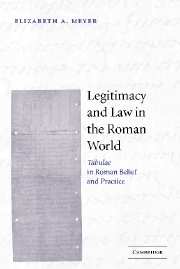Introduction
Published online by Cambridge University Press: 22 September 2009
Summary
With typically Roman prudence the emperor [Trajan], by a preliminary test of the trustworthiness of the oracle [of Apollo], took steps to thwart the possibility of hidden human trickery, and began by sending sealed tablets [codicillos] with a request for a written reply. To the surprise of the priests, who were, of course, unaware of the nature of the emperor's tablets, the god bade a sheet of papyrus [chartam] be brought and ordered it to be sealed, without any writing on it, and dispatched. When Trajan received the document he was filled with astonishment, since the tablets [tabellis] he had sent to the god also had had no writing on them; and he then wrote and sealed other tablets [codicillis], to ask whether he would return to Rome after the war was over. The god thereupon bade a centurion's vine branch be brought from among the dedicated offerings in the temple, broken in pieces, and the pieces wrapped and sent to the emperor.
(Macrobius, Saturnalia 1.23.14–16)To the god the emperor of the Romans sent tablets; to the emperor the god of the Greeks sent papyrus in reply. Apollo was far the more practical: Egyptian papyrus was the paper of the ancient world, inexpensive and, in the East, ubiquitous. In parts of the Roman Empire where papyrus could not be had cheaply, as in the cold camps on Hadrian's Wall, folk might write instead on the bark of trees.
- Type
- Chapter
- Information
- Legitimacy and Law in the Roman WorldTabulae in Roman Belief and Practice, pp. 1 - 8Publisher: Cambridge University PressPrint publication year: 2004

